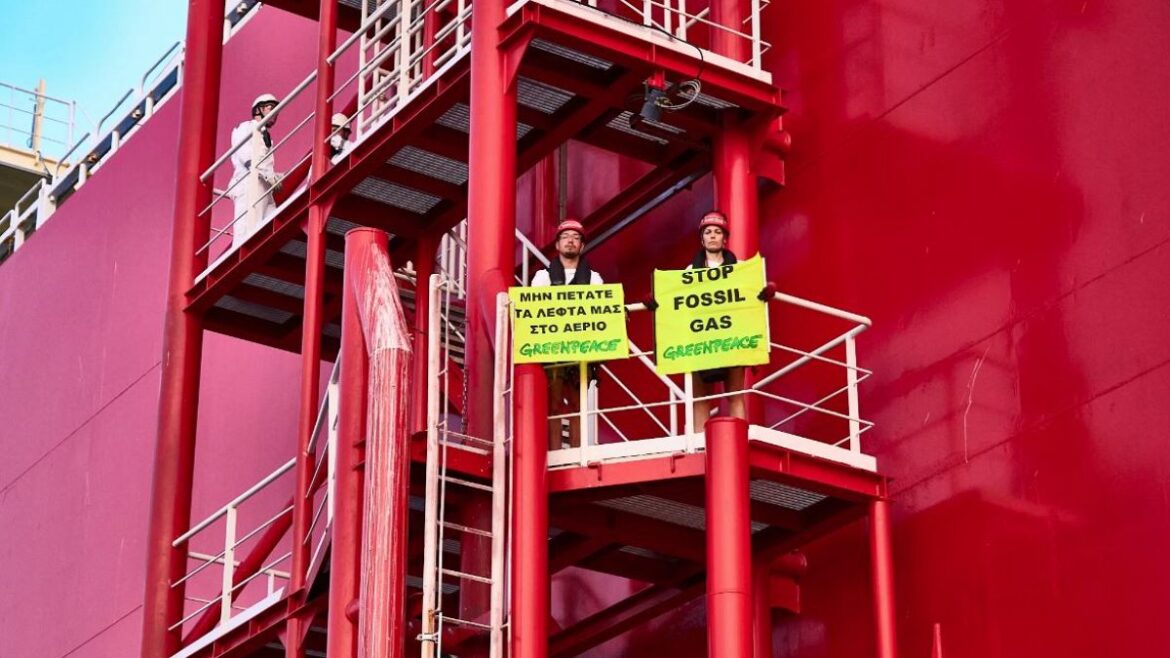By euronews with Greenpeace
Published on
ADVERTISEMENT
The Greek Coast Guard stopped a three-hour protest by activists from the Greek office of Greenpeace at the FSRU Alexandroupolis floating liquefaction unit on Wednesday.
The activists were anchored with banners reading «STOP fossil gas» and on the staircase of the terminal with banners that said «Fossil gas: not approved», aiming to send a strong message against what they say are the country’s unnecessary and wasteful investments in fossil gas.
Greenpeace said it didn’t prevent the plant’s operations and its only aim was to highlight the problem and the need for rapid decarbonisation of fossil fuels and a just transition to a zero-emission economy.
Today’s action comes with an urgent demand to the government: ban the construction of new fossil gas plants in Greece and phase out fossil gas by 2035. Only then do we have the chance of limiting global warming to tolerable levels and rescuing the country’s vital natural resources from the climate crisis, according to the environmental organisation.
«The peaceful action of our office activists sent the message that fossil gas, whether in liquid or gaseous form, is the same dirty fuel, and should have no place in our lives,» says Costas Kaloudis, Climate and Energy Campaigner at Greenpeace’s Greek office.
«It destroys our climate, health, environment and economy. The government must immediately reconsider its stance on building new gas plants in the country.»
Why is Alexandroupolis FSRU a target for climate protestors?
The Alexandroupolis FSRU is located in a marine protected area and is largely financed by public funds.
Its presence and operation have serious implications for the present and future, as it causes greenhouse gas emissions, particularly methane, the most powerful greenhouse gas.
It also disturbs the marine environment in the country’s most important fishing ground, sucking up millions of tonnes of seawater and killing fish and other marine organisms.
Along with other environmental organisations, Greenpeace has appealed to Greece’s Council of State to cancel the plant’s permits because of its serious environmental impacts and its contribution to the worsening climate crisis.
The action is taking place as a partial reopening of the plant is expected in August, as well as a hearing of the environmental organisations’ appeal in October.
This peaceful action is also part of Greenpeace’s Europe-wide Fossil Free Future campaign and the Stop Fossil Gas tour across Europe. The organisation’s flagship ship, Arctic Sunrise, is touring European cities to raise awareness about Europe’s energy system and the need for immediate decarbonisation.
At the same time, it is promoting the abolition of fossil gas and a fair and gradual transition to renewable energy sources, which will allow everyone to meet their energy needs at decent prices, without harming society, the planet and the environment.
The ship has visited Belgium, Italy and Croatia, and last weekend came to Greece, in Heraklion, Crete. Greenpeace has published a Europe-wide call for a ban on all new fossil gas – and fossil fuel – infrastructure projects in the EU, which has already gathered 83,000 signatures.
What is Alexandroupolis FSRU?
The floating storage and regasification unit – or FSRU – named Alexandroupolis, sailed from a Singapore anchorage in November 2023 and is now permanently moored 17 kilometres southwest of the port of Alexandroupolis.
The FSRU is owned by Gastrade together with its shareholders Elmina Kopelouzou, Gaslog, DEPA Emporia, DESFA and Bulgartransgaz (Bulgaria’s Gas Transmission Operator).
In addition to the floating LNG receiving and temporary storage and gasification plant, the project includes a subsea and onshore pipeline system through which the gas is imported into Greece, transported to the National Gas Transmission System. From there it goes to final consumers in Greece, Bulgaria, Romania, Romania, North Macedonia, Serbia and further to Moldova and Ukraine in the east and Hungary and Slovakia in the west.
«Greece is becoming an important gateway for energy in South East Europe for gas and electricity. We are a really reliable gateway for many forms of energy and we are going to contribute to the supply and carbonisation of Greece and neighbouring countries,» DESFA CEO Maria Rita Galli told Euronews in September 2024.
«In general, South-Eastern Europe has remained one of the regions most dependent on Russian gas. So a new infrastructure that allows more LNG from different countries of the world to come to this market increases the resilience of Europe in general and reduces the dependence on one source of gas.»

